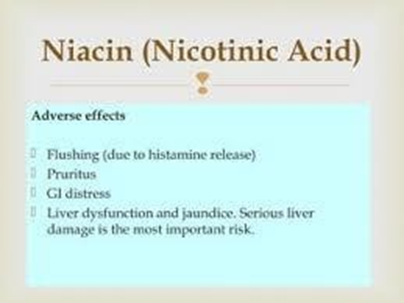A patient asks how most antidepressants work. The nurse responds by saying that antidepressants improve mood by increasing levels of:
GABA and serotonin
Epinephrine and norepinephrine
Norepinephrine and serotonin
Reticular formation
The Correct Answer is C
A. GABA (gamma-aminobutyric acid) is not typically targeted by antidepressants.
B. While some antidepressants may indirectly affect epinephrine and norepinephrine levels, the primary mechanism of action for most antidepressants is through increasing levels of serotonin and/or norepinephrine.
C. Antidepressants commonly work by increasing the levels of neurotransmitters such as norepinephrine and serotonin in the brain.
D. The reticular formation is not directly involved in the mechanism of action of antidepressants.
Nursing Test Bank
Naxlex Comprehensive Predictor Exams
Related Questions
Correct Answer is ["B","C","E"]
Explanation
A. Weight gain is not typically associated with nicotinic acid use.
B. Fever can occur as an adverse effect of nicotinic acid.

C. Flushing, or redness and warmth of the skin, is a common side effect of nicotinic acid.
D. Chest heaviness is not an adverse effect of nicotinic acid.
E. Higher concentrations of niacin has been associated with hot flashes.
Correct Answer is D
Explanation
Explanation:
A. Restricting fluid intake is not the appropriate action for a high lithium level.
B. Administering a loop diuretic is not appropriate for treating lithium toxicity.
C. Administering an additional dose of lithium would worsen the toxicity and is contraindicated.
D. Hemodialysis is the treatment of choice for severe lithium toxicity to rapidly remove excess lithium from the bloodstream.
Whether you are a student looking to ace your exams or a practicing nurse seeking to enhance your expertise , our nursing education contents will empower you with the confidence and competence to make a difference in the lives of patients and become a respected leader in the healthcare field.
Visit Naxlex, invest in your future and unlock endless possibilities with our unparalleled nursing education contents today
Report Wrong Answer on the Current Question
Do you disagree with the answer? If yes, what is your expected answer? Explain.
Kindly be descriptive with the issue you are facing.
